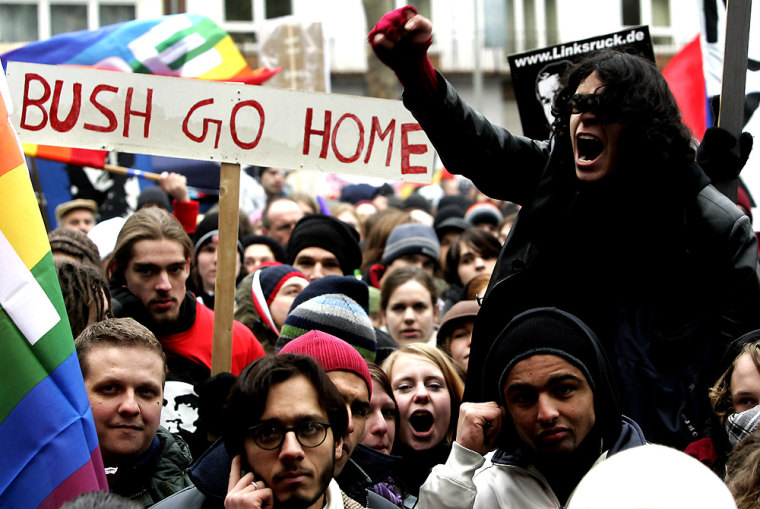The words may have been more conciliatory, but many Europeans sensed the swagger was still there.
President Bush’s outreach efforts to European leaders this week appear to have gone a way toward establishing an official thaw, but citizens around the continent remain deeply resistant to giving in to any charm offensive from a man they view as dangerous and irresponsible.
Above all, Europeans balk at what they see as the underlying message coming through all the sweet talk from Secretary of State Condoleezza Rice and the president: America intends to be the world’s policeman and expects Europe’s help in toppling tyranny around the globe.
“We Don’t Need No Cowboy,” read one sign at a protest in Mainz, Germany, where Bush warmly shook hands Wednesday with one of the fiercest critics of the Iraq war, German Chancellor Gerhard Schroeder.
Intentions in doubt
A tete-a-tete in Brussels earlier in the week appeared to have convinced French President Jacques Chirac — the man who came to symbolize world opposition to the war — that Bush is now ready for “a true partnership.”
But while leaders have pragmatic interests — ranging from trade to security issues — that may make friendly ties a wise idea, many civilians said they were cynical about Washington’s intentions.
“At the moment, the United States needs Europe to resolve the conflicts in the Middle East, notably in Iraq. Europe is an ally to Bush, which he is simply using,” said Emmanuel Rozo, 29, a communications worker in Paris.
At the heart of the trans-Atlantic divide are deep philosophical differences born of history.
Many Europeans vividly remember the devastation of the two world wars. They are enjoying peace and prosperity after centuries of almost nonstop conflict. Many associate military adventures abroad with a sense of guilt, pain and loss.
Weighing the cost of democracy
It is in this context that Europeans read Bush’s enjoinder to help spread democracy around the world. Some do not share the view of democracy as a cure-all. Others don’t think it should be “exported.” Still others — noting U.S. alliances with shady regimes — see the whole thing as a mask for other agendas.
Even among those who believe Bush, many suspect he is naive and suffers from the same type of hubris that led to disaster in European empires from ancient Rome to that of Napoleon Bonaparte.
“Europe has had disillusionments too great to permit a return to that purist belief in the transforming power of democratic institutions,” columnist Janet Daley wrote in Britain’s Daily Telegraph. “What was left standing in the ruins of the Bonapartist experiment was effectively demolished by the two world wars.”
Wherever the president has traveled this week, the jocular backslapping between Bush and continental leaders has contrasted sharply with the popular welcome he has received.
Greeted by protest
In Brussels, raucous demonstrations forced police to fire water cannons to disperse crowds gathered outside European Union headquarters. In Mainz, protesters dragged a float portraying a prisoner being beaten at Iraq’s Abu Ghraib prison through the city.
In Slovakia, where Bush arrived Wednesday for a summit with Russian President Vladimir Putin, people say they just want to see the return of the 100 soldiers their government sent to Iraq as part of the U.S.-led coalition.
“I see the presence of troops in Iraq negatively. There is no reason to be there,” said Jan Galusek, a 63-year-old retiree.
Many Europeans still bridle at what they see as Bush’s bullying tone.
“He expects people to follow orders,” said Serena Montanaro, a media studies student in Rome. “He blows the whistle and others follow.”
On top of that, few people in Europe — where oratory and nuance are the hallmark of public life, and philosophers are still part of the celebrity circuit — seem to connect with Bush’s plainspoken bluntness.
New tone soothes some, irritates others
Still, some commentators did express delight that Washington appeared finally to be acknowledging Europe’s presence.
“Bush has learned how to spell EU at the start of his second term,” said the Tages Anzeiger, a newspaper in Zurich, Switzerland.
But others expressed admiration for Bush’s muscular approach to foreign policy, and hoped he’d return to his brash, old self to whip “weak” Europeans into action.
“One wishes in all friendliness that George W. Bush, following his charm offensive, soon returns to rawer tones toward his trans-Atlantic partners,” said the Vienna newspaper Der Standard.
Britain’s Guardian newspaper cautioned in an editorial that Bush’s “flattering tone could not conceal key areas of U.S.-European disagreement.”
Among them:
- Europe is eager to use diplomacy to win an Iranian pledge not to pursue nuclear weapons; Bush, even while trying to allay fears of an attack on Iran, added in his very next sentence Tuesday that “all options are on the table.”
- The United States opposes Europe’s intention to lift an arms embargo on China.
- European leaders remained largely silent as Bush bluntly demanded that Syrian troops “and secret services” quit Lebanon.
All these disagreements contain the possible seed of future discord.
“At times he stretched credibility,” the Guardian opined. “To say that ‘no power on earth will ever divide us,’ has the sort of mock biblical resonance that often appears in his speeches but sounds hollow considering substantial differences.”
